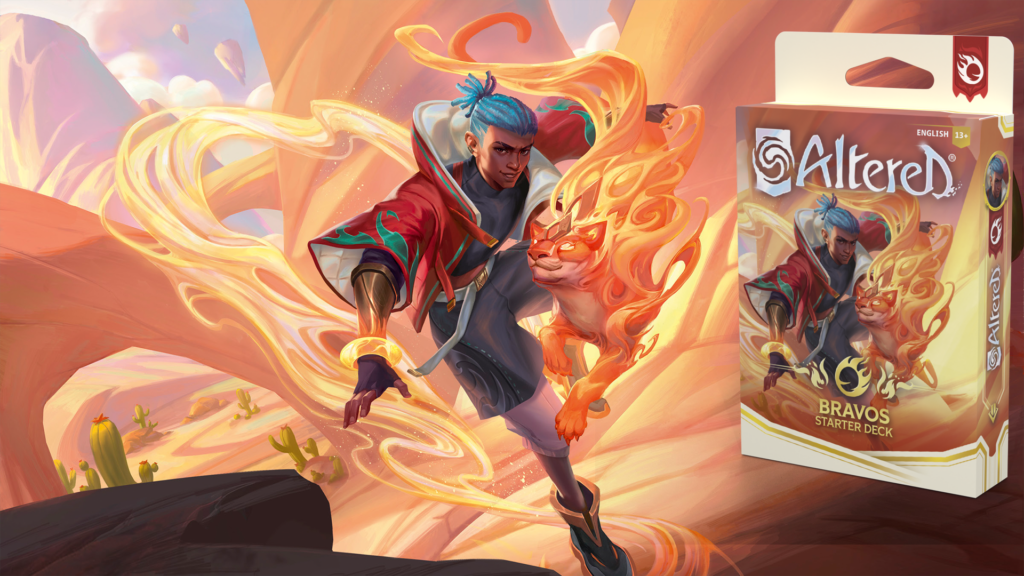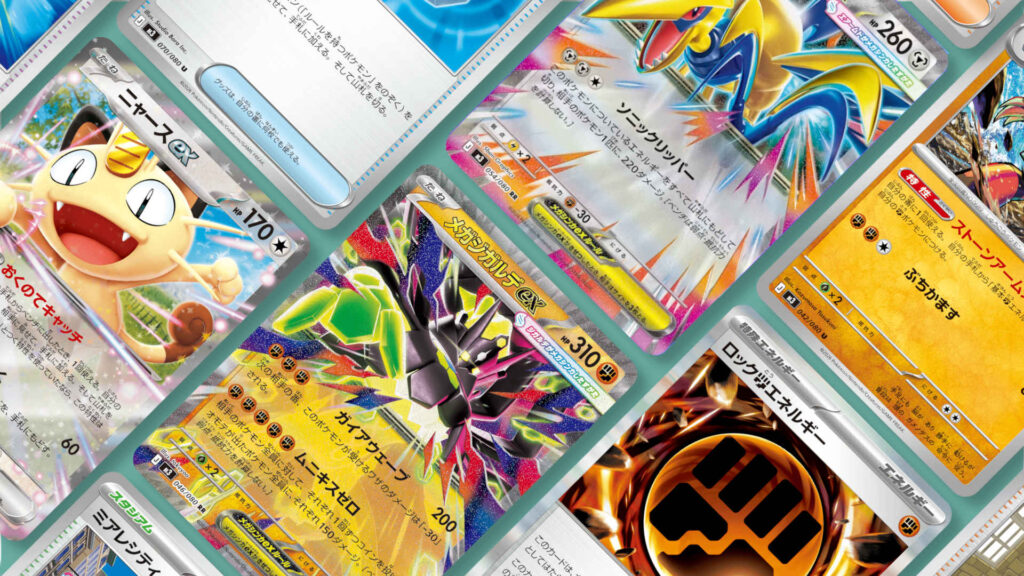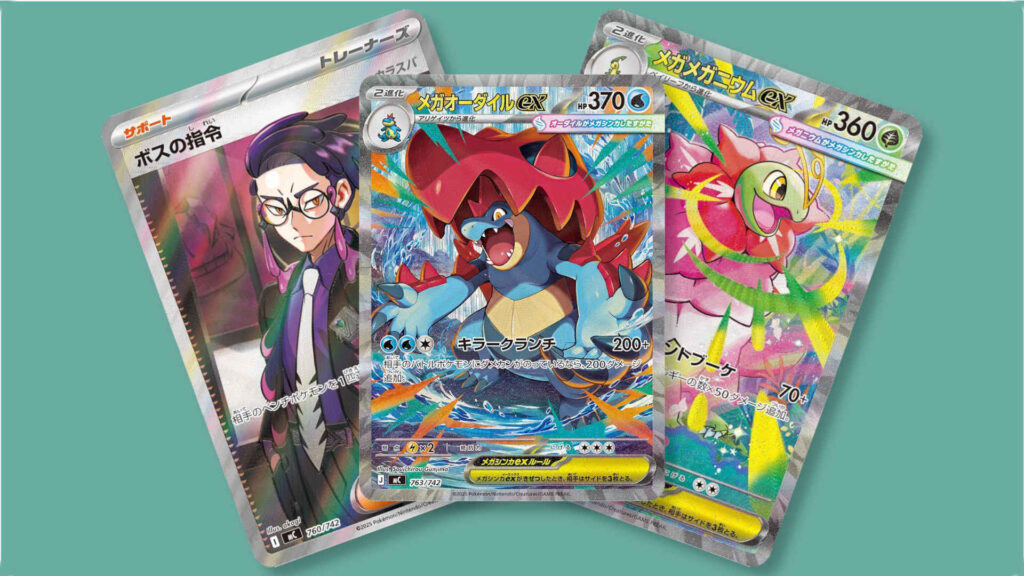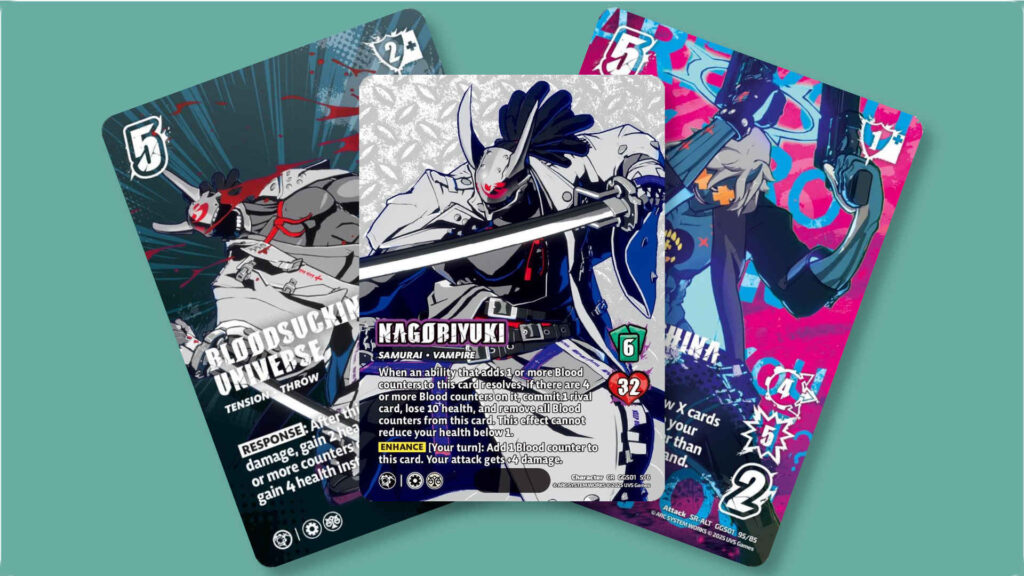Hello everyone, and welcome to the third installment of my Altered starter deck reviews. This week we’re taking a look at the Bravos starter, which so happens to be my personal favorite faction. Let’s dive right in!
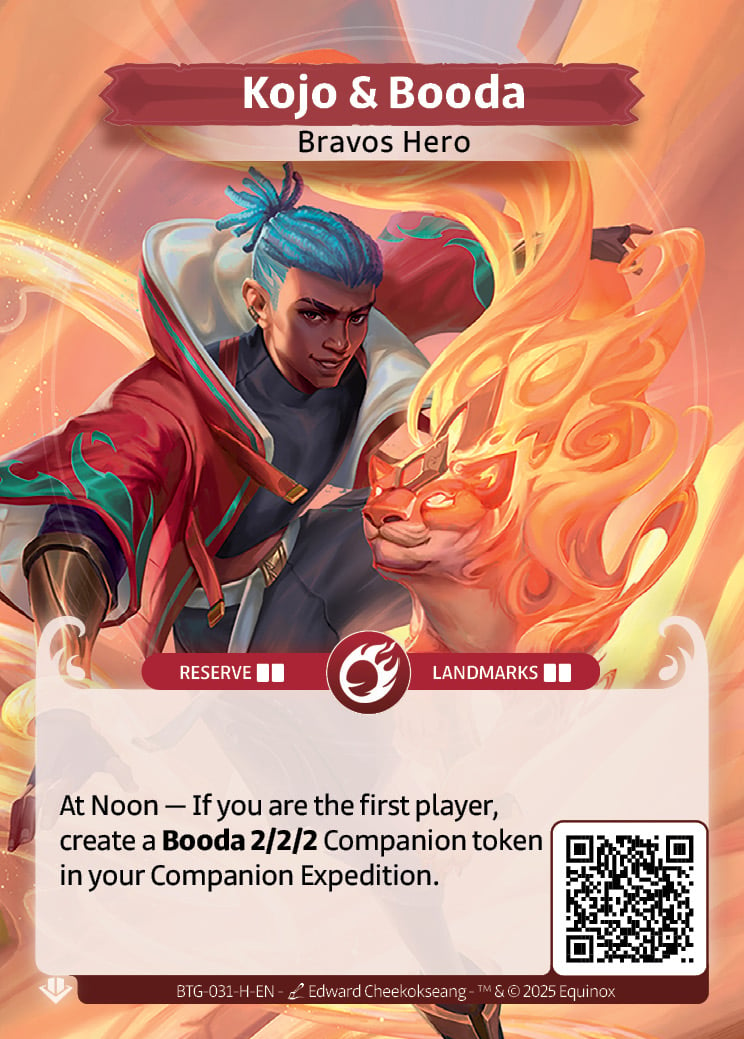
Table of Contents
ToggleBravos Faction Overview
In a word, Bravos exemplifies aggression; it’s a faction that sacrifices card advantage and staying power for strong, but fleeting characters and temporary removal. This is perhaps most noticeable when looking at cards like Bravos Tracer, Haven Trainee, and Intimidation. The Tracer is extremely above-rate, at the high cost of gaining fleeting when being played from anywhere. The Trainee has great stats for a hand-cost of two but also has a hugely tempo-negative reserve cost of four. And while Intimidation is good early, it scales poorly later into a game when the opponent can replay the bounced character.
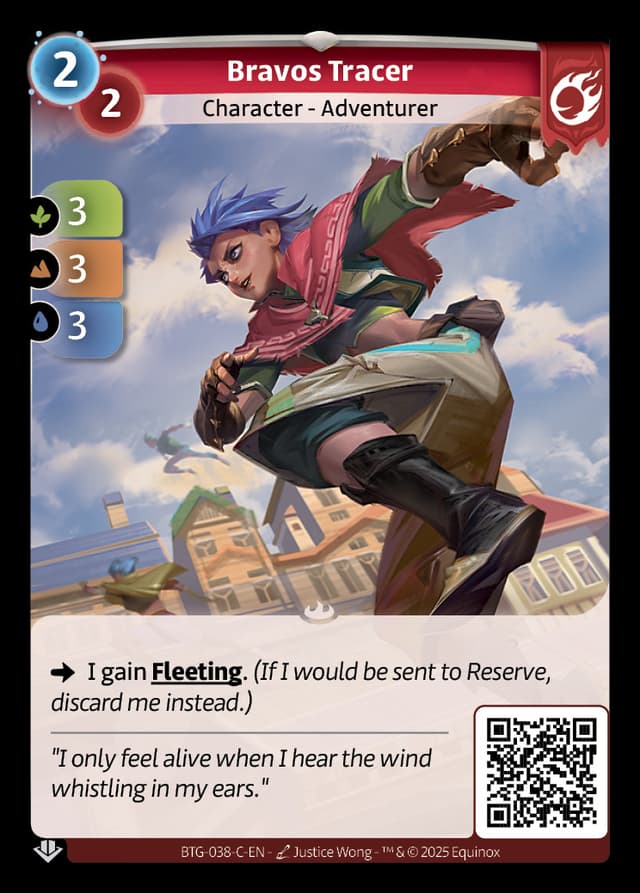
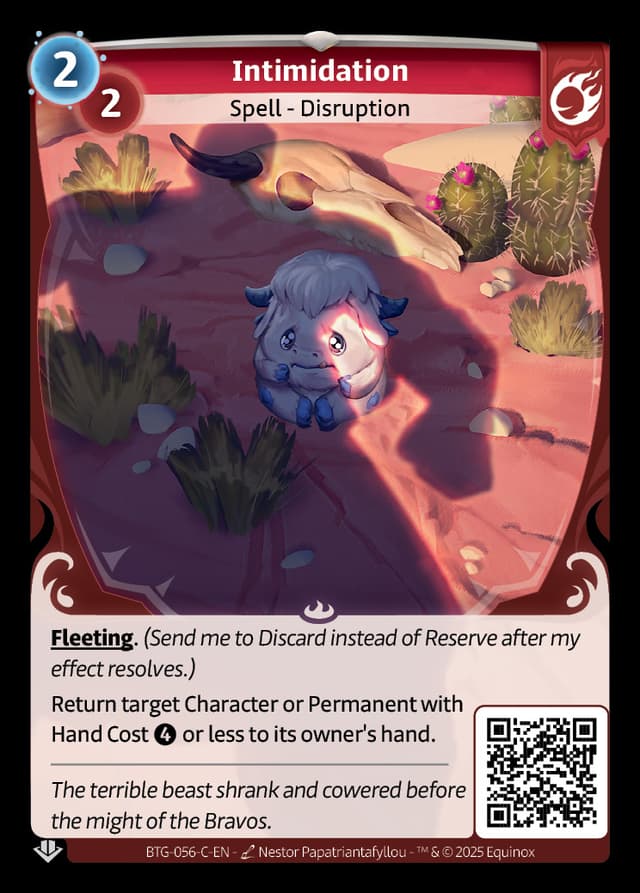
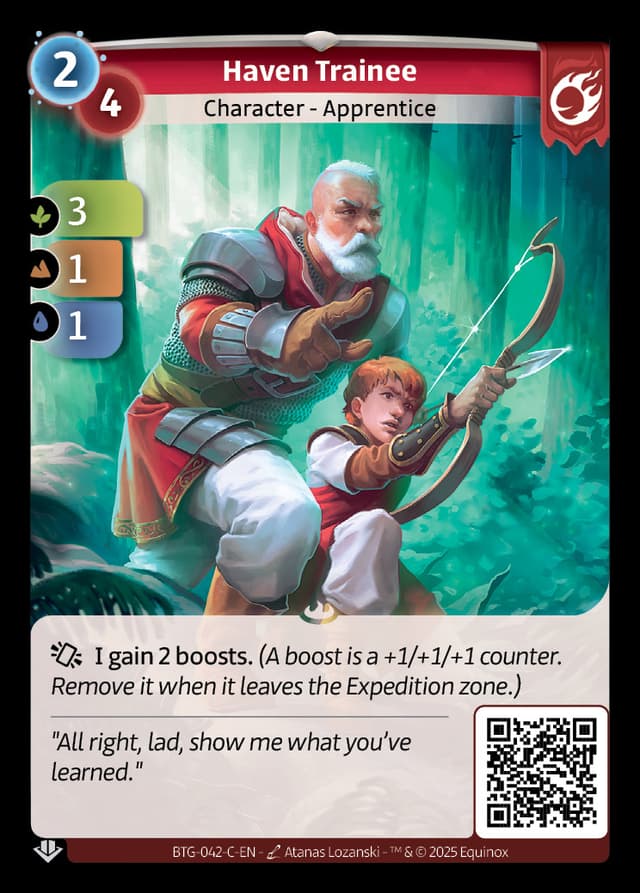
So with all that in mind, the Bravos starter provides a good pathway to understanding the play style of the faction and its marquee hero, Kojo and Booda.
Similar to Sigismar, Kojo is a token producer at Noon. However, unlike the Ordis hero, he only makes his faithful companion Booda when going first, with the tradeoff being that it has double the stats of the Recruit at 2/2/2. This means that Kojo can play an extremely aggressive game of trying to double advance on every other turn, as well as taking a turn off to develop something like a landmark and having a meaningful body in the companion expedition to contest.
Bravos Starter Decklist

Here’s the complete decklist for the Bravos Starter:
Hero
Kojo and Booda
Characters
2x Ratatoskr (c)
1x Ratatoskr (r)
3x Issun-boshi (c)
2x Bravos Tracer (c)
1x Bravos Tracer (r)
3x Bravos Pathfinder (c)
3x Haven Trainee (c)
3x Haven Bouncer (c)
2x Haven Warrior (c)
1x Haven Warrior (r)
2x Sun Wukong (c)
1x Sun Wukong (r)
3x Kappa (c)
3x Atlas (c)
1x Dorothy Gale (r,f)
1x Shenlong (r)
Spells
3x Intimidation (c)
2x Physical Training (c)
1x Physical Training (r)
Permanents
1x The Spindle, Muna Bastion (r,f)
Characters
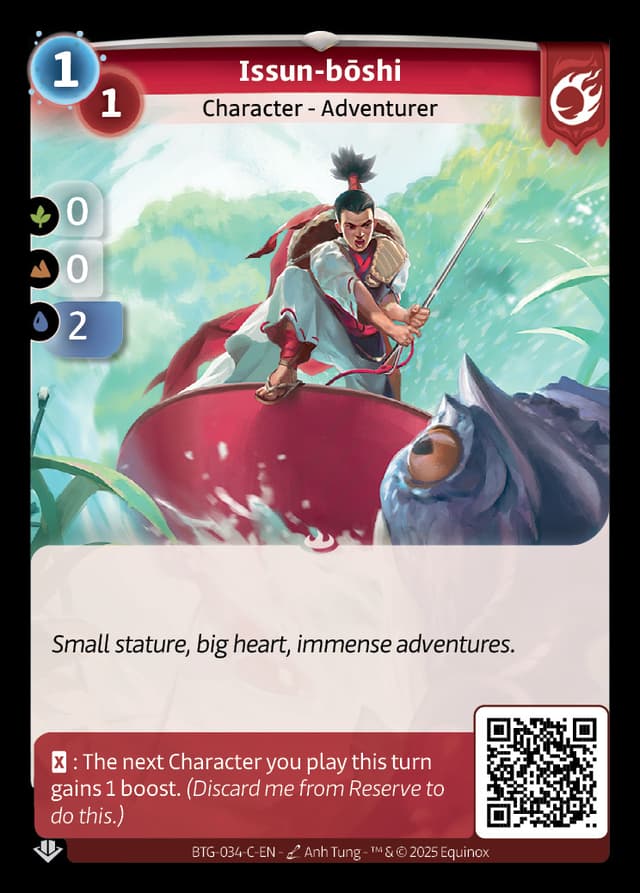
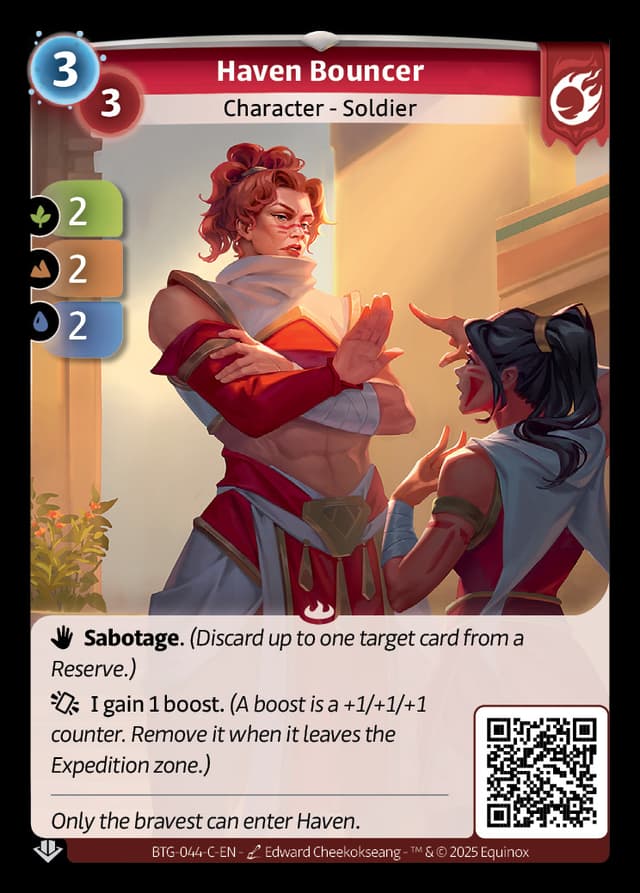
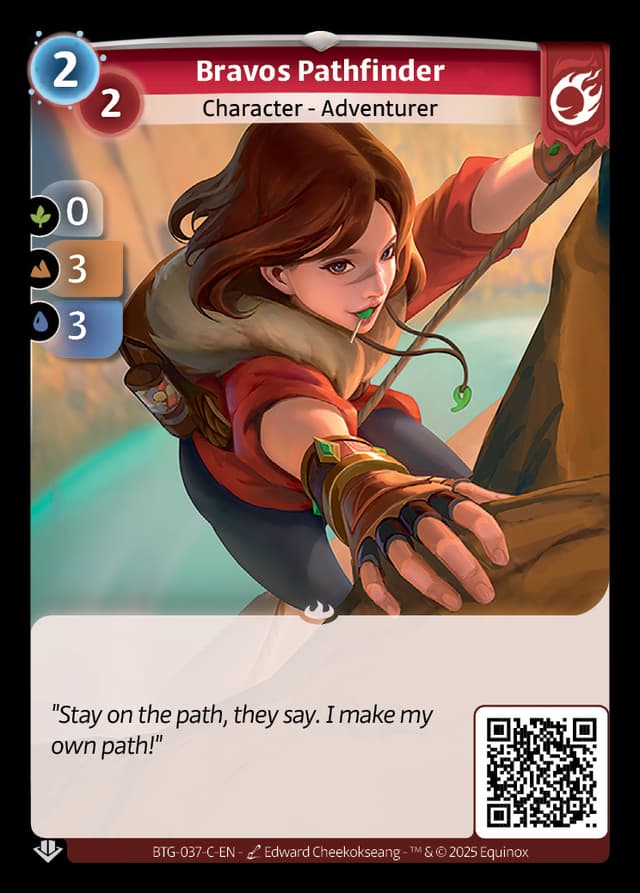
For the most part, the characters you get in the starter are actually quite decent, and feature quite a few of the ones you’d want to play in a constructed deck. However, and this is a big downside for me, the deck almost wants you to play up the curve all the way to six mana, as it provides playsets of cards like Kappa, Atlas, and even a rare Shenlong. Between the other cheap creatures, removal spells, and pump effects in the starter, I can only imagine that the sole reason for the inclusion of these higher-costing characters is only to show the range of cards that Bravos can play, and be a potential on-ramp for the “big red” hero Atsadi and Surge.
Focusing on Kojo though, these characters are quite poor in terms of rate or synergy with everything else around it, as none of these cards have anchored and only the rare Shenlong has any sort of protection in the form of tough.
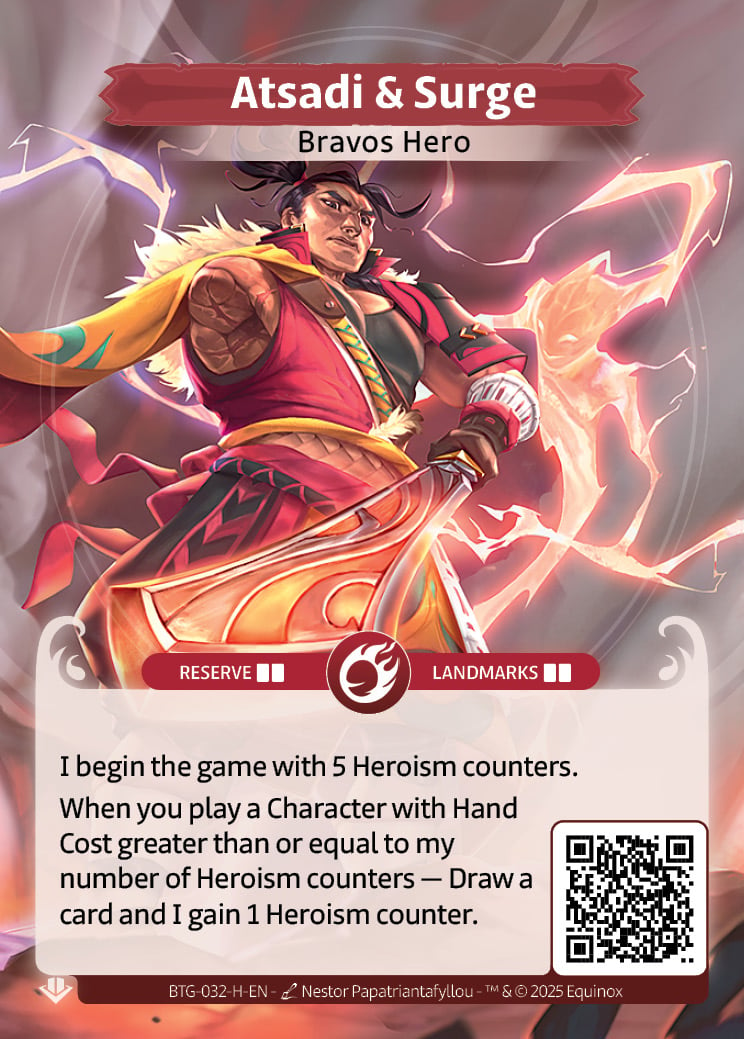
That’s not to say that there aren’t good characters in this deck. Issun-Boshi and Haven Bouncer are both fantastic, giving players access to the common sabotage option in the faction as well as a premier one-drop within the starter product is fantastic (and this time showing restraint and not randomly changing one of them to a rare copy too, I might add).
The cards I’d really like to call out though, are Bravos Pathfinder and Tracer. Both of these are similar in function as two-drops with some amount of attributes at three, the Pathfinder being a 0/3/3 and Tracer at a formidable 3/3/3 for two at the cost of gaining fleeting.
I’ve really enjoyed both of these characters as curve-filler in my own Bravos decks, and once you start adding some of the cards that remove fleeting, such as Helping Hand or Bravos Vanguard, they become hyper-efficient at contesting expeditions with sheer stats.

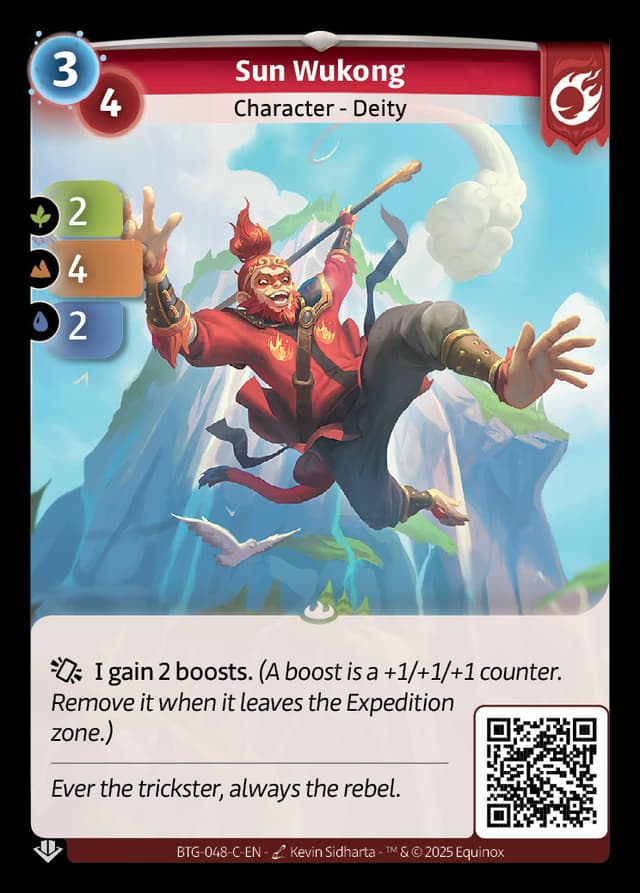
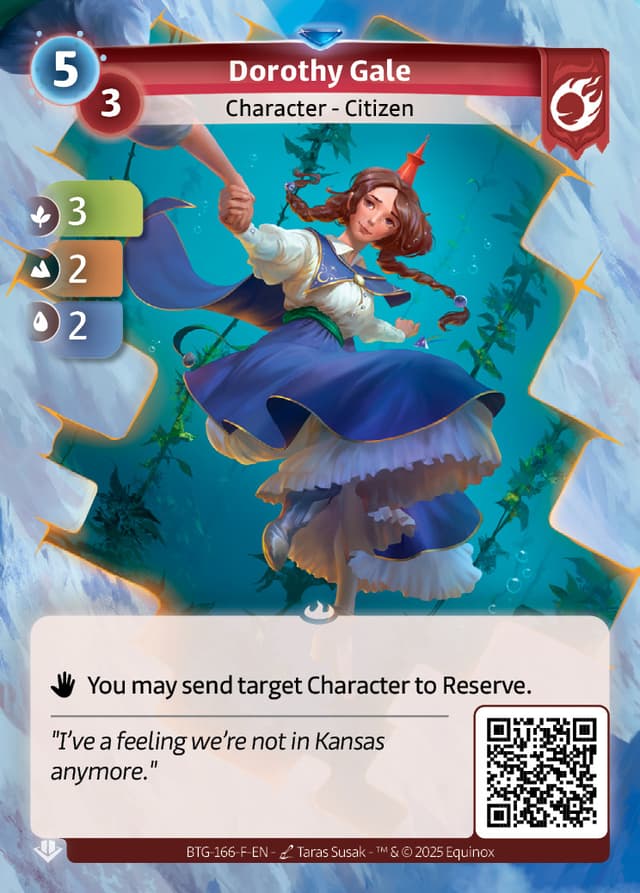
Another worthy callout is the one rare copy of Sun Wukong. While the common version is pretty underwhelming, the rare Wukong is fantastic as a play for the first two turns to score easy advances in a single expedition while maintaining cards in hand which is something that Bravos sorely needs. I’ve loved exactly one copy in my decks, as it always demands an answer, but ends up being clunkier as the game goes on and I want to be playing multiple cards in a turn, making it in some ways the ideal card to run one copy of.
One last card that deserves a callout is the inclusion of the faction-shifted Dorothy Gale. While this is normally an Yzmir character, the addition of it to the Bravos starter is actually quite a good way to demonstrate the sort of temporary removal the faction has. It’s never going to make the cut in a final completed deck, but a great card to include in a starter product.
Spells and the Permanent
The spells are the real backbone in this starter deck, providing some excellent removal and boosting options, with Intimidation being the standout among them. A card like this really shows the tempo-oriented nature of Altered, acting similar to Off You Go! in Yzmir but being able to hit a wider range of threats temporarily. In a deck like Kojo who just wants to go as fast as possible, these cards function as great speed bumps that can undo an opponent’s entire turn in the early game and allow those double advances.
Physical Training is also a solid pump spell, primarily because it doesn’t have fleeting, representing 6/6/6 worth of stats for five mana, keeping in theme with being above-rate that Bravos really wants. The rare also draws a card at the cost of being more expensive to play from hand, but in Bravos, card draw is so scarce that, for now at least, it’s worth thinking about if you have the spare rare slot.
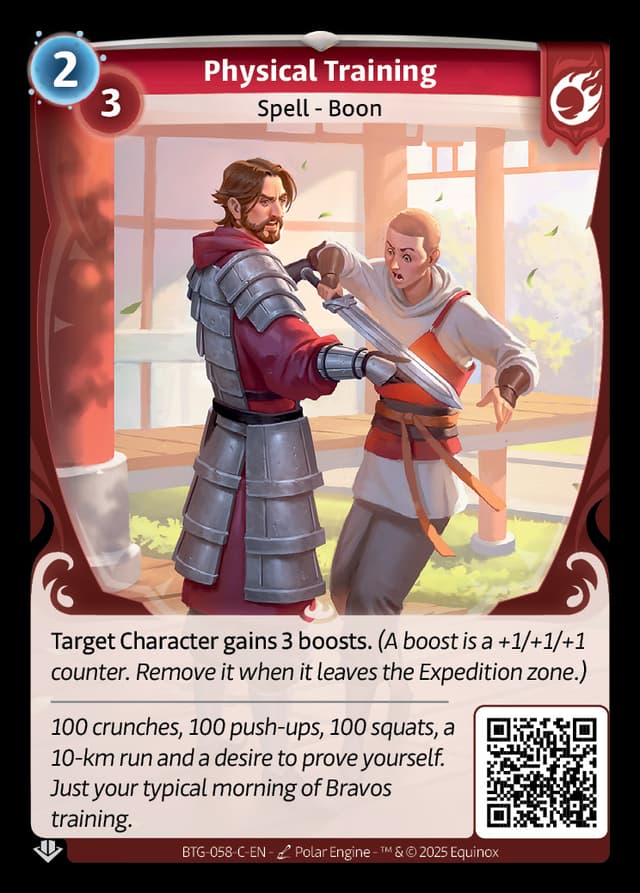
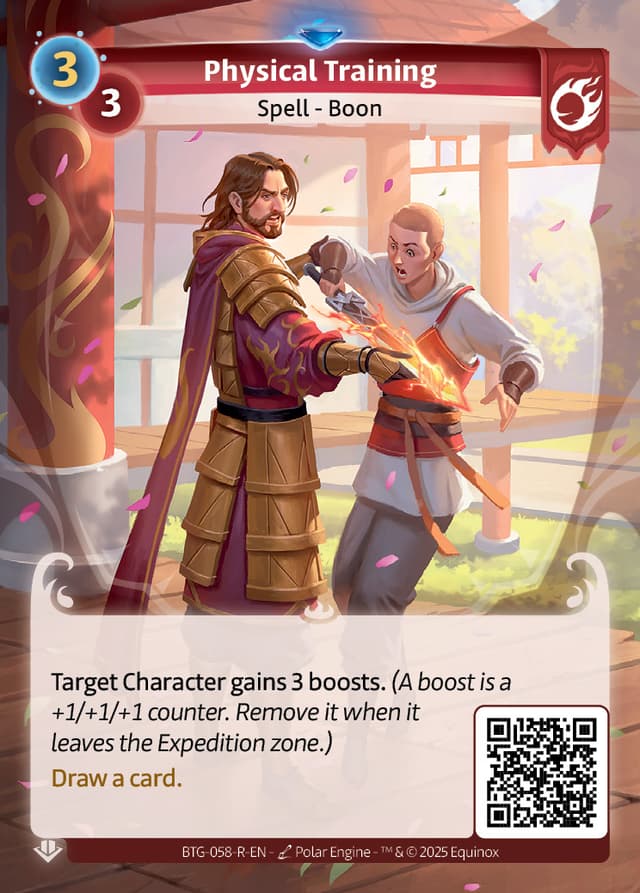
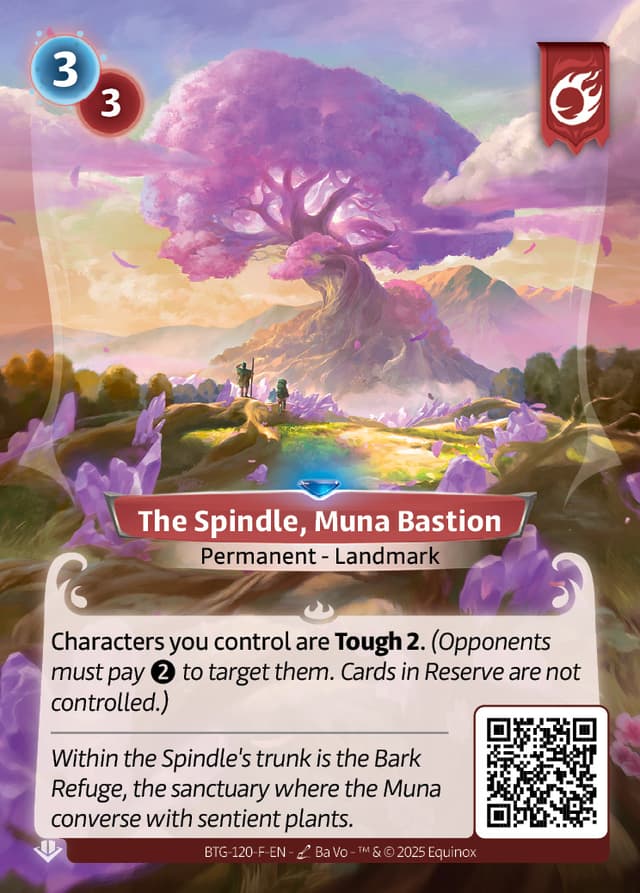
The one card I really have a problem with is this landmark they’ve added, the faction-shifted Spindle from Muna. Part of me really doesn’t understand why its here, as the idea of protecting your characters isn’t what Kojo wants to be doing for the most part. The deck and the cards in Bravos are more concerned with flooding the board with a large amount of stats for as little mana as possible, and in the event that they’re sent to reserve or bounced back to hand, the low hand or reserve cost should make replaying them trivial. Much like the inclusion of the high-costing characters, this landmark feels more like a plant for another Bravos hero, the boost-centric Basira and Kazaimon, which focuses less on going wide and more on stacking boosts onto one or two characters.
One of the major sub-themes of Bravos that’s hinted at within the starter deck’s contents is playing a card from reserve for additional effects. So many of these cards have from reserve abilities that really incentivize you to replay the same card twice. Even Haven Bouncer, which is primarily going to be played from hand for the sabotage, has a from reserve effect of gaining a boost.
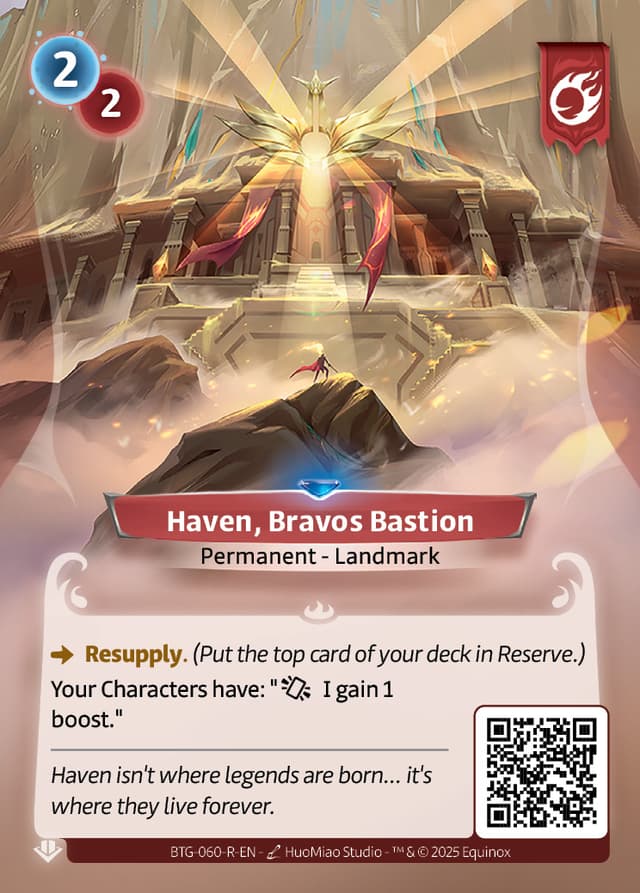
The major failure of this starter deck is that it didn’t lean heavier into this idea for Bravos, and that Haven, Bravos Bastion, should’ve been one of the first cards to be added to the starter. The landmark turns all your characters into even bigger stat-sticks, and really helps to eke out every single card for what it’s worth in order to conserve cards in hand for future turns. Being able to actually play a card on both sides is essential in Bravos due to the lack of card advantage otherwise, and Haven just makes this more appealing and consistent.
Overall, the Bravos starter is in a place that I’m torn on, as it has some great cards included alongside some extremely lackluster filler. I can see the vision that they were going for in this decklist, but some pretty major changes will need to be made before it really becomes cohesive and as functional as some of the other starters out of the box.
Upgrade Path for the Bravos Starter
Core
3x Issun-boshi (c)
3x Bravos Pathfinder (c)
2x Bravos Tracer (c)
1x Bravos Tracer (r)
3x Haven Bouncer (c)
2x Haven Warrior (c)
1x Sun Wukong (r)
3x Intimidation (c)
2x Physical Training (c)
1x Physical Training (r)
One of the issues I have with the Bravos starter is how much work it takes for it to get to a playable state that I’m happy with. I’ve tried to include as much of the starter’s common characters here, and included some of the rares that were provided, such as the one-of Sun Wukong and Bravos Tracer. The main gameplan with this deck is to get on the board as fast as possible and double advance aggressively before using the Physical Trainings and Intimidations to eventually clear a path for that final advance. To that end, basically every character here is going to be above-rate in terms of their stats to hand-cost ratio to help really push our expeditions forward.
New Cards
3x Tiny Jinn (r)
3x Chiron (c)
3x Red (c)
3x Tomoe Gozen (c)
3x Mighty Jinn (c)
3x Haven, Bravos Bastion (r)
While it may not be apparent at first glance, a lot of these upgrades are really made with pushing card advantage in mind, even if it doesn’t translate directly to drawing extra cards. Bravos has some ways of maintaining and creating advantages over the opponent beyond board pressure, and having access to them in the deck only serves to help its performance.
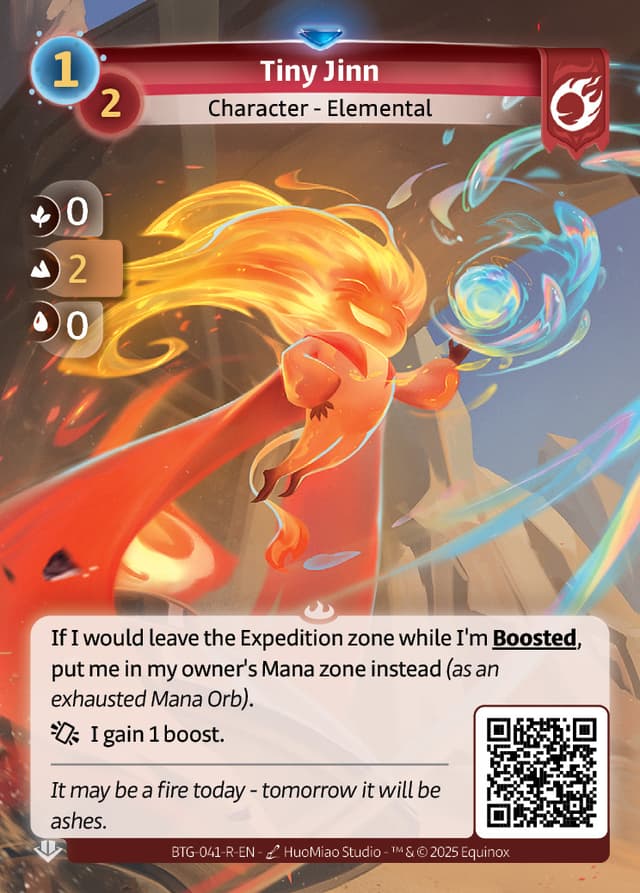
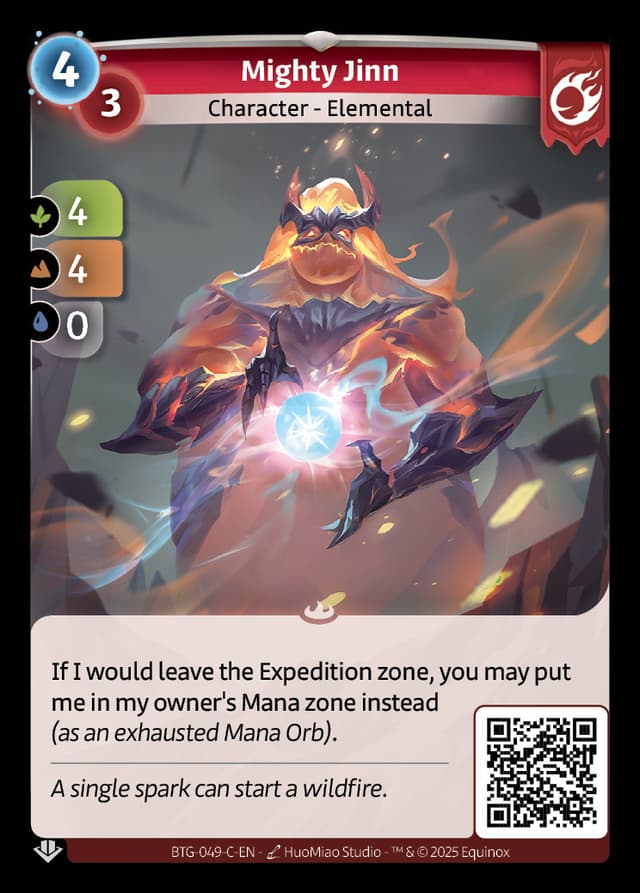
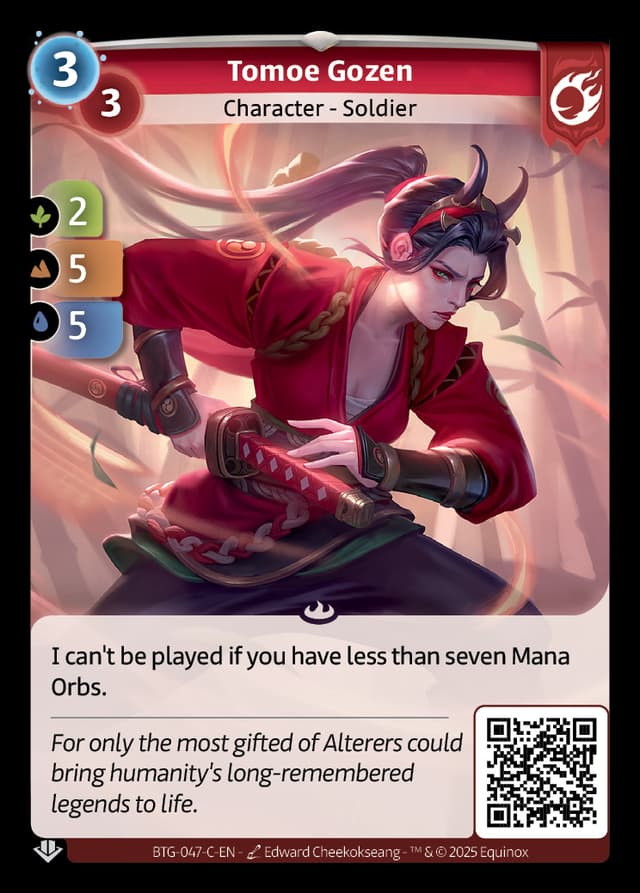
I can’t and won’t stop raving about how powerful the rare Haven is, adding resupply from anywhere to it immediately turns it into a better late-game play that actually has an effect on the board, and helps to functionally draw a card. A Bravos deck needs a very good reason to not be spending the three rare slots for a full set of rare Havens.
The rest of these upgrades are some of the other reasons I love Bravos, namely that it has access to a small suite of ramp that doesn’t sacrifice board state to work. The common Tiny Jinn was faction-shifted over to Muna, and while it performs well with Teija, the rare copy in its home faction has the fantastic change of only costing one mana. This in combination with Chiron lets you comfortably advance on turn one as well as ramp with the Jinn after it leaves the expedition zone and build your advantage in mana.
Same thing goes for the Mighty Jinns, which actually have the option to remain around for a turn in reserve before inevitably going into the mana like its tinier counterpart. There’s just a lot of ways to accrue advantage in some form or fashion beyond cards in hand. The best part is that these plays don’t sacrifice board state in order to execute, something that a faction like Yzmir sometimes suffers from. To really bolster and take advantage of all this ramping, I opted for three Tomoe Gozen in common. While it reads pretty badly (I certainly vastly underrated the card initially), a 2/5/5 for three is nothing to scoff at, especially when the Jinns are ramping you well ahead of the opponent.
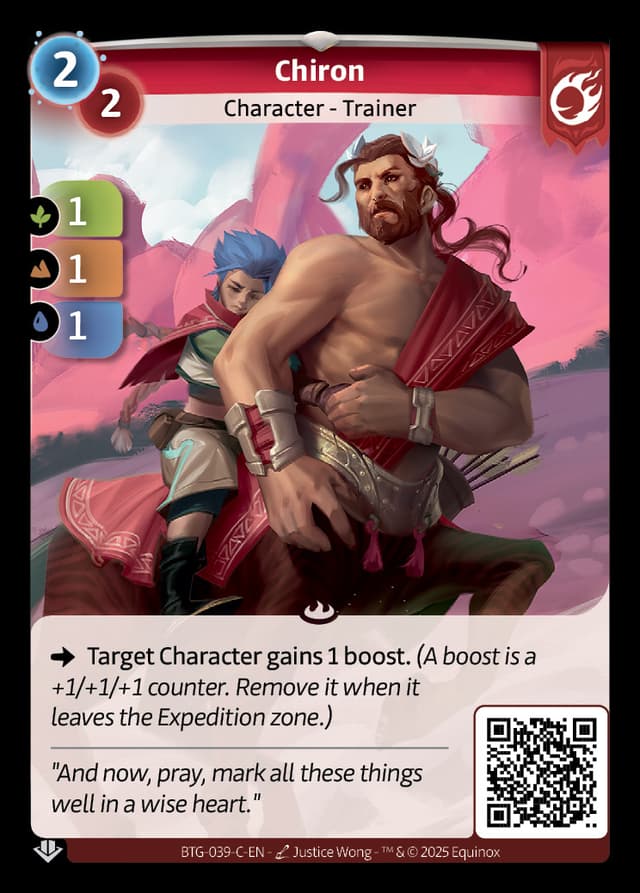
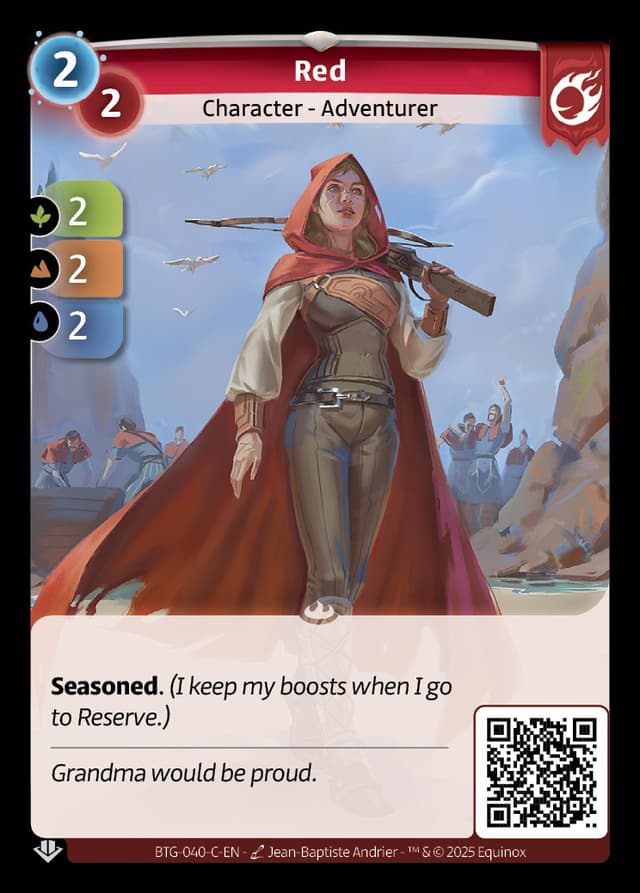
Once this ramp package is slotted nicely into the deck, a character like Red becomes more appealing to play next to Chiron in later turns. While the rare does draw a card when she has at least three boosts, it’s actually quite hard to get there, and stacking boosts onto a singular character to draw a card is just begging for it to be removed by the opponent. A cheap costing seasoned threat helps in the mid-to-late game when the opponent has started to turn the corner and develop better and more resilient characters, so having a few cards that can help get over the line is key.
Concluding Thoughts
Overall, I’m both impressed and let down by the contents of the Bravos starter. It’s great at introducing the concepts that make Bravos unique as a faction by focusing on its identity of aggression through characters, but doesn’t entirely stick the landing, simply due to almost feeling like the designers were forced to include some subpar cards (looking at you, Kappa) in order for there to be some clear cuts when upgrading. The upgraded decklist I presented leans into the hyper-aggression and double advancing, while also incorporating the minor ramp package to try and accrue card advantage in some form.
Trial by Frost previews have started rolling in, and I must say that the initial disappointment of the first few reveals have faded away as more cards are shown. I’ll be taking a break on the starter deck upgrade series to focus on the new expansion in my next article(s), so I’m keen to discuss with you all about it then!
Want more Altered? Check out our reviews of the other starter decks: Ordis, Muna, Lyra, Axiom, Yzmir.

